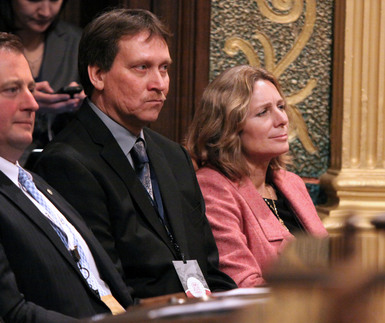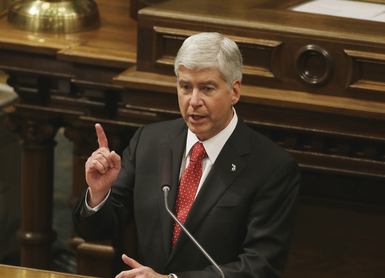Gov. Rick Snyder issued a challenge to state lawmakers in his state of the State of the State address Wednesday night: Set politics aside and solve Michigan's road funding crisis.
"This is a no-brainer," he said. "We can decide how long we want to argue about it, how political we want to make it, or we can just use some common sense and get it done."
Michigan remains the auto capital of the world, Snyder said, but now the state must do its part to make sure its roads and bridges measure up.
He said there's a clear choice: Pay less now, or pay more later.

State Rep. Gretchen Driskell, D-Saline, listens to Gov. Rick Snyder's State of the State address Wednesday. Manchester Village President Pat Valliencourt joined the representative for the event.
Courtesy photo
"The governor is absolutely correct that we have disinvested in our infrastructure," said state Rep. David Rutledge, D-Superior Township. "I thought he made a good case for making the expenditure now, because it saves us later. I subscribe to that argument."
But if the governor's plan for raising more revenue means higher vehicle registration fees, Rutledge said he might have some concerns.
"I'm almost more willing to move to something that could be spread more broadly with less impact at a single time," he said. "I think we haven't explored all the opportunities."
Snyder said the state can either ask users of the state's roads to pay an extra $120 per year per car now, or pay 2.5 times that amount in 10 years.
Investing an extra $1 billion per year now, he said, would reduce the cost of car repairs, create more than 12,000 jobs, and save nearly 100 lives per year from traffic accidents.
"There's no price you can put on that," Snyder said. "If you step back and look at this, it's an opportunity to say let's just do the right thing and invest in our roads, keep our citizens safer, create jobs, and have us save a whole lot of money and not stick our kids with a big bill."
Snyder gave a "shout out" to state Sen. Roger Kahn, R-Saginaw Township, who has taken a lead on the issue, and he encouraged others to join him.
State Rep. Adam Zemke, D-Ann Arbor, said adequate support for the state's road infrastructure is extremely important, so he was pleased to hear the governor make it a top priority for 2013.
Still, Zemke said it wasn't clear from the governor's speech if the $1 billion or more in new "user fees" would come from vehicle registration fees or a gas tax increase or both.
"The number he used tonight was over $1 billion," he said. "It's a large number, and quite frankly we need to do something about the infrastructure. It's been crumbling for a long time and we've never put our money where our mouth is on this. I think all things need to be on the table."
State Rep. Gretchen Driskell, D-Saline, said she's optimistic that positive change is within reach if legislators and the governor are willing to work together.
"The governor's recommendation to raise the level of funding for transportation has great merit," she said, adding the Washtenaw County Road Commission's funding is so low it has caused a significant drop in service. "I have worked locally for many years on our transportation system, and I am very concerned about the lack of revenue supporting our transportation infrastructure."

Snyder made roads a top issue in his State of the State.
AP Photo/Carlos Osorio
State Rep. Jeff Irwin, D-Ann Arbor, said Snyder has identified a problem, but he hasn't demonstrated the leadership necessary to draw a majority of votes from lawmakers. Snyder has been calling for more road funding since 2011, but the idea hasn't gained traction in the Legislature.
Irwin said he isn't prepared to support anything until he sees a specific plan from the governor, though he agrees Michigan has terrible roads.
"He needs to find a way to turn his party around on this issue, because it's really one that Republicans have been standing on the other side of for quite some time," he said.
Irwin said he's not sure what route the governor will go, but he predicts it would be difficult to get a gas tax increase approved given the low level of popularity the idea enjoys — together with the fact that many Republicans in the Legislature have signed no-tax pledges.
Irwin said there are a number of things that would have to fall into place for him personally to support a gas tax increase, and it would have to include a commitment to public transit, nonmotorized transportation and spending state transportation dollars more wisely.
All four Democrats who represent Washtenaw County in the state House said they were disappointed Snyder didn't talk more about education funding Wednesday night.
"I really heard precious little abut how we were going to make Michigan schools and universities better," Irwin said. "There was really nothing there for our K-12 and higher education institutions that have taken such a huge hit in the last two years."
Zemke said it strikes him that the governor's emphasis on up-front investment in transportation infrastructure also applies to funding public education.
Snyder is expected to deliver his budget message on Feb. 7, and Zemke said he's waiting see what the governor actually proposes.
Rutledge said there was an awful lot of rhetoric about working together Wednesday night, but he hasn't yet heard anything that translates to policy.
Irwin gave the governor credit for his calls for election reform, including no-reason absentee voting — something Irwin has been pushing since he took office two years ago.
Snyder also used part of his State of the State to push for no-fault insurance reform, saying the state needs reasonable limits and cost controls to bring down insurance costs for residents.
"In terms of claims coming in, the severity of claims, we far exceed every other state in how expensive our claims are," he said. "The average claim in Michigan is $44,000. The next two states are $17,000 and $10,000, and that leads to high auto insurance costs for people, our citizens."
Ryan J. Stanton covers government and politics for AnnArbor.com. Reach him at ryanstanton@annarbor.com or 734-623-2529. You also can follow him on Twitter or subscribe to AnnArbor.com's email newsletters.



















